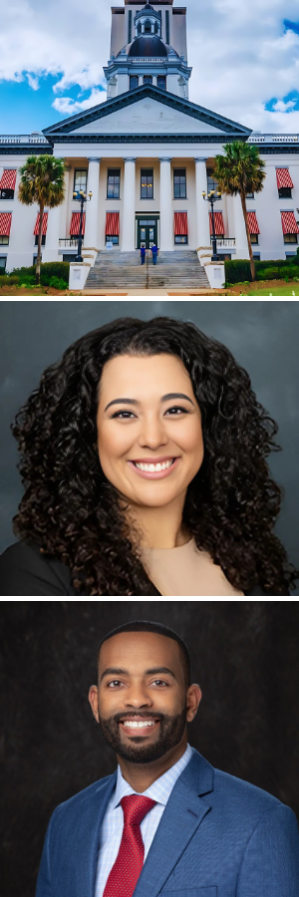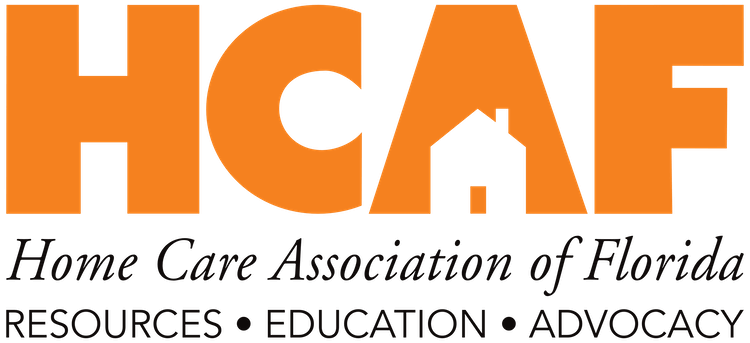HCAF’s Advocacy Secures Key Home Health Legislation for 2025

HCAF’s Advocacy Secures Key Home Health Legislation for 2025
 With Florida’s 2025 Legislative Session set to begin on March 4, home care providers have a major opportunity to expand access to care, reduce administrative burdens, and improve industry recognition. Thanks to HCAF’s advocacy efforts, our top priorities have been introduced as Senate Bill 1412 (SB 1412) by Senator Alexis Calatayud (R-Miami) on February 26 and House Bill 1353 (HB 1353) by Representative Gallop Franklin (D-Tallahassee) on February 27.
With Florida’s 2025 Legislative Session set to begin on March 4, home care providers have a major opportunity to expand access to care, reduce administrative burdens, and improve industry recognition. Thanks to HCAF’s advocacy efforts, our top priorities have been introduced as Senate Bill 1412 (SB 1412) by Senator Alexis Calatayud (R-Miami) on February 26 and House Bill 1353 (HB 1353) by Representative Gallop Franklin (D-Tallahassee) on February 27.
These bipartisan bills address workforce shortages, modernize regulations, and refine the Excellence in Home Health Award criteria to ensure meaningful recognition for outstanding providers. This is a major achievement for the home care industry, but we need your engagement to ensure these bills become law.
Key Provisions of SB 1412/HB 1353
Expanding Access to Essential Nursing Visits
Florida faces a severe home care workforce shortage, leading to delays in patient care, increased hospital readmissions, and growing demand for home-based services. Current regulations unnecessarily restrict which registered nurses (RNs) can perform admission, service evaluation, and discharge visits, limiting timely access to care.
SB 1412/HB 1353 removes this restriction, allowing all qualified, licensed RNs to perform these essential visits, improving efficiency and patient outcomes.
Increasing Administrative Flexibility in Home Care
Florida law limits home care agency administrators from overseeing more than five agencies unless they share identical controlling interests and are located within contiguous geographic areas. While originally designed to prevent fraud, modern compliance tools provide stronger safeguards without restricting administrative flexibility.
SB 1412/HB 1353 updates these regulations, allowing administrators to oversee multiple agencies under common ownership within a defined service area, ensuring greater operational efficiency while maintaining oversight.
Empowering the Excellence in Home Health Award Program
Since its creation in 2020, no home care agency has received the Excellence in Home Health Award due to excessive administrative burdens and criteria that fail to distinguish between skilled and non-skilled providers.
SB 1412/HB 1353 amends the program’s structure, ensuring agencies are evaluated based on their service type, making the award more inclusive, meaningful, and achievable.
A Bipartisan Effort to Strengthen Home Care
This legislation is a direct result of HCAF’s advocacy efforts and marks the second consecutive session in which Representative Franklin has championed home care reform. In 2024, he successfully led HB 935, aligning Florida’s home care regulations with the federal CARES Act. His leadership earned him HCAF’s 2024 Home Care Legislative Advocate Award, and he continues to be a strong advocate for providers and patients.
Now, with the support of Senator Alexis Calatayud, this legislation enjoys bipartisan backing, reinforcing that home care remains a top priority for lawmakers across party lines.
How You Can Help
Now that these bills have been introduced, home care advocates must act to ensure their passage.
- Stay Informed: Track SB 1412/HB 1353 and other legislation through HCAF’s members-only bill tracker and stay tuned for weekly legislative session recaps throughout the 60-day lawmaking period.
- Engage With Lawmakers: Contact your elected officials using the Legislative Action Center and urge them to support these critical reforms.
- Join Home Care Day at the Capitol: Participate in HCAF's annual Home Care Day at the Capitol advocacy event on March 18-19 in Tallahassee to meet with legislators in support of home care industry policy priorities.
- Support the Home Care Political Action Committee: Help fund advocacy efforts to ensure home care remains a top priority in Florida. Click here to make a contribution.
This is our chance to modernize Florida’s home care industry. Let’s work together to expand access, reduce regulatory burdens, and improve industry recognition.
